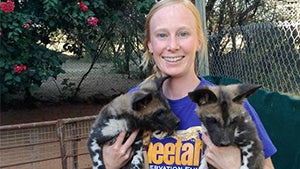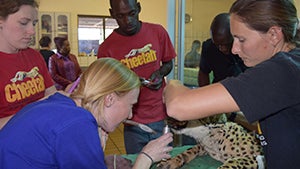Erin Belleville (Class of 2020) was one of many UC Davis School of Veterinary Medicine students who participated in an externship or internship this year through our Office of Global Programs. This is her account:
 My summer of 2017 actually turned into winter as I was granted the opportunity of completing a veterinary internship with the Cheetah Conservation Fund (CCF) in Namibia. With funding provided by the UC Davis School of Veterinary Medicine Office of Global Programs, I was able to spend eight weeks in Otjiwarango, Namibia gaining experience in research, as well as wildlife and exotic animal medicine. The main focus of my internship was to gain clinical experience with exotic felids. However, with very little research experience, I planned to get my feet wet in that department as well.
My summer of 2017 actually turned into winter as I was granted the opportunity of completing a veterinary internship with the Cheetah Conservation Fund (CCF) in Namibia. With funding provided by the UC Davis School of Veterinary Medicine Office of Global Programs, I was able to spend eight weeks in Otjiwarango, Namibia gaining experience in research, as well as wildlife and exotic animal medicine. The main focus of my internship was to gain clinical experience with exotic felids. However, with very little research experience, I planned to get my feet wet in that department as well.
Cheetah Conservation Fund takes a holistic approach when it comes to managing the population decline of the endangered cheetah (Acinonyx jubatus). The facility conducts important research, educates the public, and focuses on conservation of the species and the environment. This multi-faceted approach allowed me to gain knowledge and skills in many aspects of wildlife medicine.
 During my time at CCF, I had the opportunity to work with a variety of species from domestic dogs and livestock, to wild and rescued cheetahs, and African painted dog puppies. Upon arrival at the facility, I was quickly integrated into the daily management of the 17 year old cheetah named Sandy. This handleable cheetah was being treated for kidney failure, and allowed me to administer her twice-daily subcutaneous fluids and medications. As my internship progressed, I also helped manage and treat a second elderly cheetah, also diagnosed with kidney failure. This cat was less keen to be handled by people, so she was treated in a squeeze cage, allowing me to learn and practice a different set of skills.
During my time at CCF, I had the opportunity to work with a variety of species from domestic dogs and livestock, to wild and rescued cheetahs, and African painted dog puppies. Upon arrival at the facility, I was quickly integrated into the daily management of the 17 year old cheetah named Sandy. This handleable cheetah was being treated for kidney failure, and allowed me to administer her twice-daily subcutaneous fluids and medications. As my internship progressed, I also helped manage and treat a second elderly cheetah, also diagnosed with kidney failure. This cat was less keen to be handled by people, so she was treated in a squeeze cage, allowing me to learn and practice a different set of skills.
Both of these cats also presented me with an important research project: writing up case studies, for which I researched the disease processes, treatment options, and summarized the progression of their cases including all treatments and results of those treatments. I found this very interesting, as this is something I was dealing with hands-on in the field, and in the clinic. In addition to these two projects, I was also able to help with a variety of other research studies going on, including fecal monitoring for hormones, genetics testing, parasite testing, and a study on brucellosis in the local livestock being performed by Monica Milstein (another UC Davis veterinary student). All of the research projects that I was able to be a part of gave me a deeper understanding of the diverse opportunities in research, and also a sense of pride in knowing that each of these research projects has an important role in the conservation of cheetahs.
 In addition to research projects, and daily cheetah treatments, I was also able to be part of more than 10 different procedures. From collecting samples on a wild male cheetah, to watching dental cleanings, extractions, and root canals, I gained experience monitoring anesthesia, intubating, drawing blood, placing catheters, and even performing a necropsy after a humane euthanasia of an older cheetah. I also learned, practiced, and developed various other skills including sample collection, proper measurements of the animals for documentation and research purposes, record keeping, and darting procedures for wild or non-handleable animals. I’ll never forget the feeling of doing each of these things for the first time.
In addition to research projects, and daily cheetah treatments, I was also able to be part of more than 10 different procedures. From collecting samples on a wild male cheetah, to watching dental cleanings, extractions, and root canals, I gained experience monitoring anesthesia, intubating, drawing blood, placing catheters, and even performing a necropsy after a humane euthanasia of an older cheetah. I also learned, practiced, and developed various other skills including sample collection, proper measurements of the animals for documentation and research purposes, record keeping, and darting procedures for wild or non-handleable animals. I’ll never forget the feeling of doing each of these things for the first time.
With all of the excitement with cheetahs, and the incredible learning opportunities that came along with their care, it is hard to imagine that I also had the privilege to assist with procedures on the livestock guardian dogs, goats, and sheep, as well as to provide neonate care to the rescued wild dog puppies. It is difficult to express in so few words what an incredible experience my summer (winter) internship at CCF provided. I am grateful to have had the chance to learn from experienced veterinary staff, and to have had the opportunity to build lasting relationships with fellow interns, to blend with a variety of cultures, all working toward the same goal of conservation and education. I appreciate the knowledge that I have gained from this experience, and look forward to carrying it with me as I pursue a career in exotic animal medicine.
